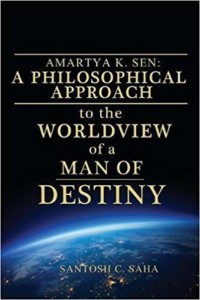Title: Amartya K. Sen: A Philosophical Approach to the Worldview of a Man of Destiny
Author: Santosh Saha
Publisher: Book Venture Publishing, LLC
ISBN: 978-1640697768
Pages: 440
Genre: Non–Fiction / Philosophy
Reviewed by: Arthur Thares
Pacific Book Review
Philosophy is not a genre for every reader, but those who enjoy it will tell you that it is a mind-expanding experience. Even if you don’t agree with the ideas that are presented it forces you to take a stance and think about your ideals. When you think about the philosophy, you probably think about the classic philosophers like Socrates and Plato, but one thing this book does well is to remind us that there have been great philosophers throughout time and there are some still around us today.
In Amartya K. Sen: A Philosophical Approach to the Worldview of a Man of Destiny, author Santosh Saha attempts to break down philosopher Amartya K. Sen’s life and speculate where his liberal thoughts developed. This book is equal parts Sen’s biography, an amalgamation of philosophical thoughts, and a history of India. It mostly reads like an essay but sometimes dives into storytelling through history and attempts to connect Sen’s worldviews with not just philosophy but geography, economics, politics, and religion.
Amartya K. Sen is far from a light read, and the author does not help by filling the book with elaborate words that are unnecessary in an already complex subject. When you compound the wordiness with a page count of nearly 400, it can be rather daunting. If you can look past the shere size and word density, there is a lot of great insight from both Sen and the other philosophers quoted in the book. Sometimes the main point of the essay seems to get lost for some time, but Saha always circles back to re-connects his thoughts.
Saha is an intelligent author with a fantastic understanding of philosophy and philosophers. He provides an in-depth look into the concepts of Sen’s liberal ideology and its physical, geographical, and intellectual influences. There are points in the book which seem a little self-serving, but you can form your own opinions on Sen’s theories on India and the world as a whole.
I cannot say that this book is for everyone, it is a specialized subject with a limited audience. That being said, for those who are interested in Eastern philosophy, this is probably the kind of book that you wouldn’t want to put down. The good news is that Amartya K. Sen is a deal at any price because it will take a while to read initially and still be a great resource for the rest of your life.



Follow Us